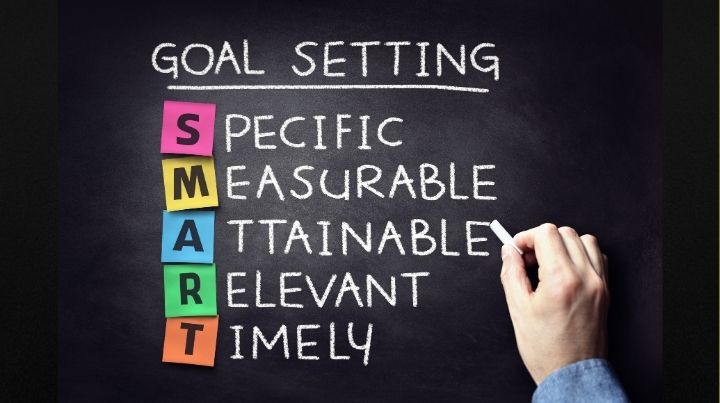SMART Goal Setting

SMART goal setting is an excellent technique for effectively setting and meeting our goals. Setting SMART goals is especially helpful for people whose goals focus on overcoming life's challenges.
The truth is improving your life and the lives of those around you is usually worthwhile. Fortunately for preparedness-minded people, there's a method of improving oneself and others. That method is through the use of personal goal setting.
Why Set Smart Goals?
When it comes to personal goal setting, one helpful aid to ensuring follow-through on our part is by the use of the SMART goal setting method. It's by making SMART goals that we increase the likelihood of accomplishing our objectives.
In the case of preppers, accomplishing our objective leads to increased safety, security, and personal resilience. In turn, meeting our preparedness goals results in less anxiety and higher confidence levels for ourselves and our loved ones.
SMART Goal Setting Manages Expectations.
Setting SMART goals helps people manage expectations for themselves and others. Often, a lack of follow-through in attaining one's goals is due to setting unrealistic expectations on ourselves.
Therefore, when SMART goal setting, some forethought and assistance with managing our goals is helpful.
Sure, I'd love to climb Mount Everest! And the odds of that happening are slim to none.
While I may want to climb Mount Everest, perhaps I should set my goal to successfully climbing some local mountains first. Maybe just making sure I get up and go for a hike once a week would be a more focused and better personal goal to get the ball rolling.
And that's where SMART goal setting comes in.
Smart Goal Setting Stands For:
Specific
Be specific. We are often less successful in succeeding at our goals when we leave them overly broad. In other words, focus on what you need to do to achieve your goal.
For example, if you want to eat a healthier diet, don't just say, I want to eat more healthily.
Instead, set goals such as I am going to eliminate sugar from my diet, or I won't eat after 8 pm.
One way to help make your personal goal setting more specific is to use the Five W's.
- Who: Who do you need to involve to achieve your goal. If you want to become more healthy, maybe that's a trip to your doctor or consulting with a nutritionist or personal trainer.
- What: What is your goal? Perhaps you want to lose 10 pounds or be able to run five miles without stopping. While figuring out the “what,” work to identify any requirements or struggles you may have in achieving your goal. Knowing what you want to achieve and the hurdles you may face ahead of time makes it more likely that you will achieve it!
- Where: Where do you need to go to achieve your goal? Maybe you need to go to the gym. Perhaps it's out to a nearby trail or the doctor's office to get started. Answering the “where” will help you be better prepared when it's time to make your goal happen.
- When: When will you work to achieve your goal? For example, every morning, you'll stretch and head outside for a walk around the block when you wake up. If you're dieting, maybe you don't eat until noon every day. Whatever it is, set a time and stick to it!
- Why: This one is easy. Why do you want to achieve your goal? What are the reasons you want to make your goal happen? Perhaps you want to fit into an old pair of jeans again, or you want to run a marathon. Whatever the case, understanding the why behind your goal will help keep you motivated to achieve it.
Measurable
The ability to measure your progress is a great motivator. After all, how good does it feel when, after dieting, you get on the scale and see a pound or two has faded away?
Some ways to measure your goals are to ask yourself questions like, “How many pounds do I want to lose?” Another might be, “How much sleep do I want to get a night?”
In other words, ask yourself questions that will help you to know when you've reached your goal, what you're shooting for, or the progress you make along the way.
Achievable
To succeed in meeting our goals, they must be achievable. In other words, setting unrealistic goals is a recipe for failure.
If you want to organize your train wreck of a garage, and you can barely walk in it, setting the goal of making it pristine by next weekend may not be doable.
It's essential to make goals achievable. Unachievable goals will cause frustration and failure to derail our plans causing us to plop our butts on the couch, saying, “I'll get to it later.”
Relevant
Motivation is required to work towards a goal, especially one that is not easy. Because we need the motivation to work towards goals, we also need to make sure that our goals matter. The way we make sure that our goals have value is by ensuring they are relevant.
We can determine the relevance of our goals by deciding whether they are essential to us. Goals that are not truly important, don't matter, or are not valued are more likely not relevant.
Not only do we need to check the importance of the goal, but we also should ask ourselves if what we want is worth the time and effort it will take to achieve it?
If we decide a goal is relevant, we should also ask ourselves, is it worth the effort and personal cost to pursue? In other words, is our goal worth the sacrifice?
Timely
A goal is NOT a goal unless we set a time for us to complete it. When we set a completion date, we put ourselves on notice that we have work to do.
Setting a time when to achieve our goal by also helps us prioritize what we do and when. Perhaps there will be days that working towards your goal may take second place compared to other life events. Then, there may be days that your plan must come first.
So remember, when setting a goal, make sure to select an end date, or it is likely to become a goal that never gets finished.
The Bottom Line
In the end, successfully setting goals is best accomplished with forethought and planning. Through our forethought and planning, we are best able to improve our situation and become better prepared for what lies ahead.
With that in mind, an excellent tool for ensuring our future success is through SMART goal setting.
Now, get going on setting your goals. As you do, let us know in the comments below whether SMART goal setting works for you!
Stay safe,

Related Articles
FREE Guide
Read the Best Seller
Join Mind4Survival
Stay informed by joining the Mind4Survival! 100% Secure! 0% Spam!
Affiliate Disclosure...
Mind4Survival is a free, reader-supported information resource. If you make a purchase through our link, we may, at no cost to you, receive an affiliate commission.
Do You Want To Be Ready No Matter What?

Download our free 39-page guide with interactive, 7-Day Emergency Kit Checklist and take the first step toward real preparedness.
- Know exactly where to start.
- Save time and money.
- How-to build a complete Basic Emergency Kit.
- Level up your safety and security.
Join Mind4Survival
Stay informed by joining the Mind4Survival! 100% Secure! 0% Spam!





